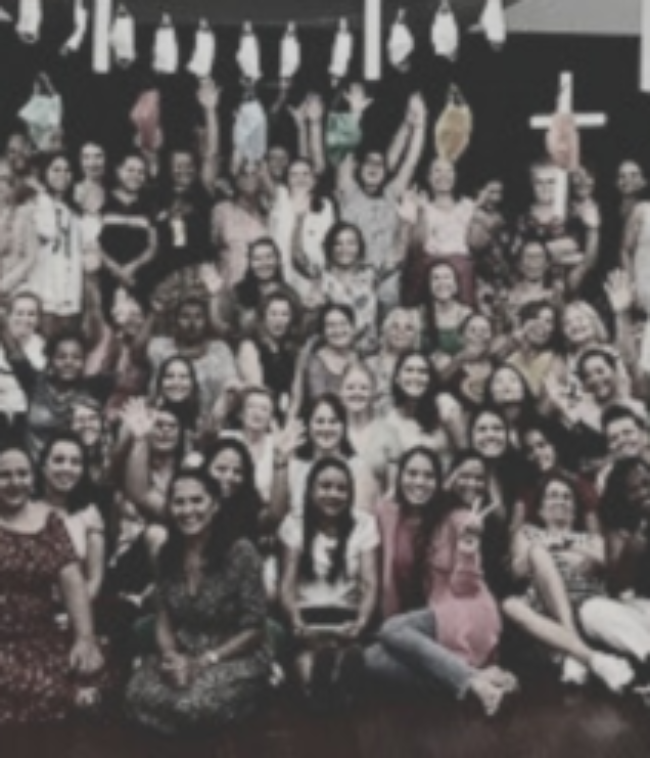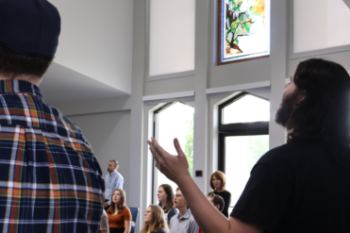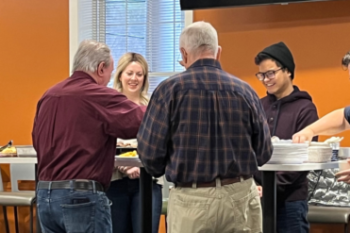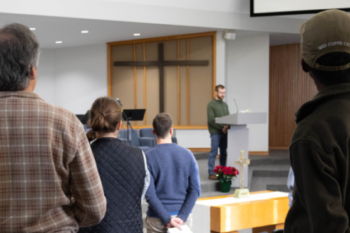Retelling Our History: Stone Campbell Sanders & EU
In undergrad I took a reading course on Church history. Our reading list involved a great variety of texts from early Christian primary sources to comprehensive histories of the crusades, Reformation, and more. Yet in the thousands of pages of Church history, the name Sanders never crossed my desk. David and Ruth Sanders, that is, the missionaries credited with bringing the Christian Church movement to Brazil in 1948. During this time, the American missionary couple opened the first Christian Church in Brazil in the city of Goiânia, located 200 km from the federal capital. In 2023, when I visited Brazil, the Christian Churches in Brazil were celebrating 75 years. I even brought home a t-shirt after preaching at a Christian conference that said, in big block letters,
“Stone
Campbell
Sanders
& Eu (the Portuguese word for “You”).”
I had made the trip to Brazil to visit fellow pastor and mentor, Renata Vicente, ECS alumna, MDiv ‘17. Renata and I had been meeting over Zoom as part of the Ministry Resource Center’s mentoring program. Renata is part of the latest wave of Christian Churches associated with the missionary movement started by Sanders. Thomas and Elizabeth (Libby) Fife were part of the second wave of American missionaries who arrived in Brazil in the late 1960s. The couple settled in the outskirts of the city of Goiânia, where they began to pastor Igreja de Cristo Norte de Goiânia. In 1973, Tom and Libby Fife ordained Gerson Vicente and Robert Fife. Several years after their ordination, Gerson Vicente de Sousa married Iolanda, and they had three children, among them Renata Vicente.
As a youth minister in my first five years of ministry, connecting with Renata, a long-time minister, was an unexpected source of safety, camaraderie, and counsel. I was able to ask questions like, how do I create a healthy culture in my area of ministry? Should I pursue ordination? How do I officiate my first wedding? Do I, as a woman, belong here? And later, how can I show up with the gifts of being a woman in ministry more fully, more confidently? After hours of meeting virtually, I wanted to ask and see her answers to these questions in her own life of ministry in real time. Renata and I decided to apply for a Mini-Grant through the MRC in hopes of being able to minister and be encouraged together in person for the first time. We received the grant. I secured a plane ticket. And we set our sights on two full weeks of ministering alongside one another.
I could tell you any number of stories from our time together, but the story that still sits most tenderly in my heart is retreating with the women of Renata’s church in Caldas Novas, a city situated on top of the largest hydrothermal resort in the world. One might expect that enjoying therapeutic waters of famous natural hot springs would be the major highlight of my visit. It turns out 90 degree weather and 100 degree water weren’t the ingredients for my perfect retreat. It was something else altogether. The highlight came from watching the assured and patient leadership of Iolanda and Renata, mother and daughter, leading the women of Primeira Igreja de Cristo de Taguatinga in retreating and connecting together. They planned worship services and retreat elements and then turned them over to the women and the Spirit of God. Together the women wept, danced, ate, studied, rested, laughed, hugged, dreamed, learned, prayed, listened, and loved one another. Though I could only catch one Portuguese word out of a hundred, I sat in the worship services, at the dinner table and around the pool, hearing the clear reminder that the Spirit of God, vivid in this sisterhood of women, was here with me too.
Together the women wept, danced, ate, studied, rested, laughed, hugged, dreamed, learned, prayed, listened, and loved one another. Though I could only catch one Portuguese word out of a hundred, I sat in the worship services, at the dinner table and around the pool, hearing the clear reminder that the Spirit of God, vivid in this sisterhood of women, was here with me too.
Growing up as a young woman in a Christian Church and later at a Christian college, I often missed the chance to hear other ministers or professors urge me into ministry. Having never seen someone who looked like me behind the pulpit and sitting in circles that debated where I belonged in the church, it was difficult to foster an imagination for a life in ministry. I spent my twenties seeking counsel on how my life, bolstered by experience in public speaking, mentoring, creativity, leadership and knowing the Spirit of God as close and active, could be fully given over to that work in a Church tradition that was not always ready for me. The deep-seated feeling that you might not belong can show up in unexpected ways. I found myself preferring my personality traits that were more stereotypically male as I worked to choke back tears, feelings, or tenderness– stereotypically feminine traits. I found myself wondering if I would ever feel, despite the later efforts of co-ministers, like I belonged as the officiant at a wedding, a funeral, in a local ministers’ meetup, or as a voice preaching to faces unlike mine.
Worshiping alongside Brazilian Christian women, the Spirit of God, for the umpteenth time, reminded me that the Spirit is in these women as the Spirit is also in me. I saw the people of God enriched by the presence of all these human traits on display—laughter, learning, dancing, weeping and embracing. I saw the people of God enriched by the lifelong ministering of Iolanda and Renata—leading youth, women, and entire churches. I reflected on the importance of the conversations Renata and I had over Zoom and how she was a regular reminder that if God broke into my quiet imagination for a life of ministry to call me to pastor, God will make a way, create support, remind me that I belong, and encourage me to minister like I was created—as a woman.
I saw the people of God enriched by the presence of all these human traits on display—laughter, learning, dancing, weeping and embracing. I saw the people of God enriched by the lifelong ministering of Iolanda and Renata—leading youth, women, and entire churches.
The seeds planted by the early Church bear such sweet fruit when our imagination for the kinds of people it involves is cultivated. This legacy invites a multi-dimensional approach to styles of preaching, pastoral care, and serving. It draws our attention to the different kinds of people that make up our cities and finds a way for churches to create spaces that honor the fuller spectrum of the people of God. It develops an imagination for how we engage our cities’ great injustices, answering poverty, addiction, and the orphaned—with nuance, relationship, and faithfulness. And it makes a way for those who do not see themselves represented in the pulpit, to find the Spirit of God drawing them there all the same.
When I consider the Church history readings course in undergrad, I feel connected to the names on those pages, to the names forgotten and to those not yet written. And as I look at the Spirit of God moving in my own Church history, I know part of it is written by Renata Vicente and Iolanda Sousa. Their own church histories were written in part by each other and by the first woman missionary of the Christian Churches to come to Brazil, Ruth Sanders. As well as the missionary that came after Ruth and led Iolanda to faith, Elizabeth Fife. And if you put that in big block letters on a t-shirt at a Christian conference you’d see:
“Sanders
Fife
Sousa
Vicente
& Me”





